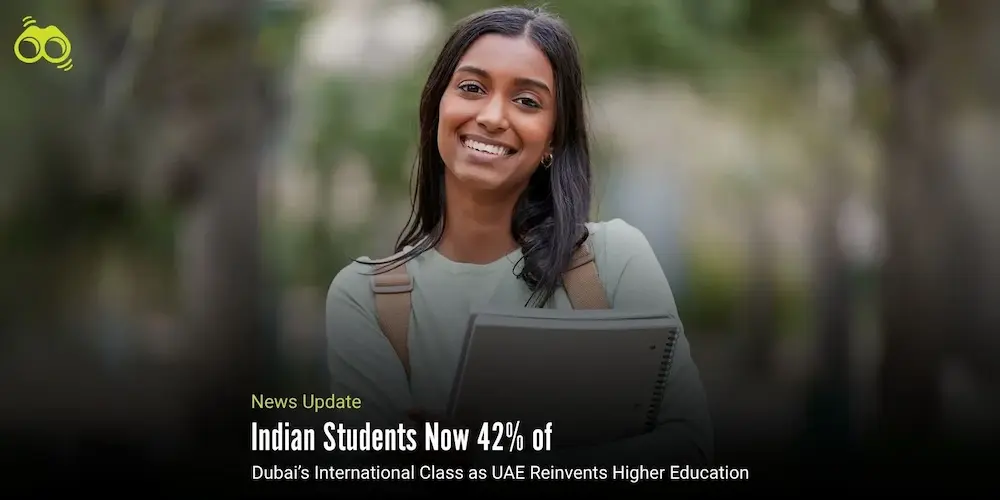Dubai Introduces Inclusive Residency Schemes to Attract Global Academic Talent
42% of International Students in Dubai’s Universities Now Indian Nationals
Dubai is steadily positioning itself as a leading global education hub, propelled by targeted reforms and a long-term vision to reshape its higher education landscape by 2033. As part of this strategic framework, the city aims to expand the number of private higher education institutions from the current 41, including 37 international university branches, to over 70. Complementing this ambition are progressive initiatives such as broadened student visa options, international scholarship schemes, and guaranteed employment for 90% of graduates, all of which are enhancing Dubai’s appeal to international learners.
A clear marker of this upward trajectory is the significant increase in student enrolment. In the 2024–25 academic year, overall enrolment in Dubai’s higher education sector rose by 20.4%, a notable growth compared to the previous year’s 12.3%. Simultaneously, the proportion of international students climbed from 25.3% to 29.4%, further validating Dubai’s emergence as a preferred study destination. Central to this transformation is the robust presence of Indian students. According to data from the Knowledge and Human Development Authority (KHDA), Indian nationals comprise 42% of the international student body in Dubai’s universities, with especially strong representation in high-demand fields—business (54%), information technology (11%), and engineering (11%). These figures reflect both academic interest and growing trust in Dubai’s educational ecosystem.
To advance this momentum, Dubai is set to welcome renowned institutions such as IIM Ahmedabad, the American University of Beirut, and Fakeeh College for Medical Sciences, with their new campuses scheduled to open in the 2025–26 academic year. Such developments, paired with flexible residency schemes like the Golden Visa, are establishing Dubai as a formidable alternative to traditional destinations, including the UK, the US, and Australia. The 2024–25 academic year saw 42,026 students enrolled across Dubai’s private institutions, with bachelor’s programmes accounting for 53% and master’s degrees comprising 37%. Notably, Indian influence is evident not only among students but also among faculty, with nearly 29% of licensed institutions' teaching staff of Indian origin, contributing to a greater sense of cultural familiarity and academic confidence.
Although conventional post-study work visas are not currently available, the UAE has introduced various long-term residency pathways, including jobseeker and freelancer visas. An update to the Golden Visa now enables select Indian and Bangladeshi nationals to acquire residency without property investment or trade licences, offering more equitable access for skilled professionals.
According to recent reports, the pilot phase of the reformed Golden Visa extends eligibility to a broader demographic, including scientists, educators, maritime experts, and digital creators. Under the revised criteria, qualified individuals may obtain long-term residency for a one-time fee of AED 100,000 (approximately ₹23.3 lakh or USD 27,000), replacing the previous requirement of AED 2 million in investment. This shift marks a decisive move towards inclusive and skill-driven residency policies. Dubai’s evolving higher education model, supported by rising Indian enrolment and inclusive residency reforms, is redefining the global landscape of academic mobility.
Editor’s Note:
Dubai is making big changes to become a major global centre for higher education. Its clear and ambitious goals like opening more universities, forming international partnerships, and giving strong support to students show that the city is serious about becoming a top study destination. The fact that Indian students now make up the largest group of international students in Dubai is not a surprise. It reflects the city’s success in offering quality education that is accessible, close to home, and trusted by families. These changes also raise important questions about how students will choose where to study in the future. With easier long-term residency options like the Golden Visa and well-known universities opening campuses in Dubai, the city is offering more than just education; it’s also offering career opportunities and stability.
Skoobuzz notes that with the rapid growth and reforms in Dubai’s higher education sector, international students now have a strong and realistic alternative to traditional study destinations such as the UK, US, or Australia. If this momentum continues, Dubai is well on its way to becoming a major global education hub.














0 Comments (Please Login To Continue)